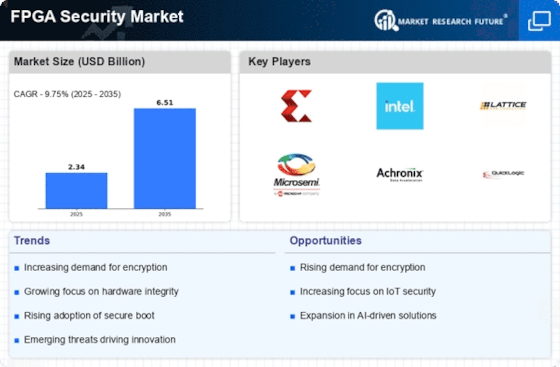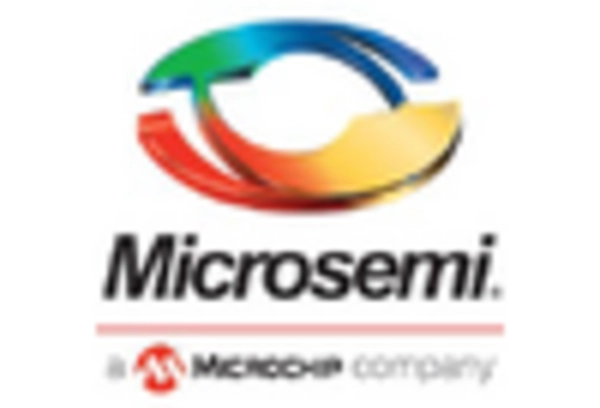Market Trends
Key Emerging Trends in the FPGA Security Market
The FPGA (Field-Programmable Gate Array) security market is witnessing significant shifts and advancements in response to the escalating concerns regarding cybersecurity threats, intellectual property protection, and data integrity. FPGAs, which offer reconfigurability and high-performance computing capabilities, are increasingly deployed in critical applications spanning industries such as aerospace, defense, telecommunications, and IoT (Internet of Things). As we delve into the market trends of FPGA security, several key factors emerge that are shaping its trajectory.
One prominent trend in the FPGA security market is the growing emphasis on securing the hardware fabric against a myriad of cyber threats, including reverse engineering, tampering, side-channel attacks, and malicious modifications. With the proliferation of sophisticated cyberattacks and the increasing complexity of FPGA-based systems, there is a heightened awareness among organizations regarding the need to implement robust security measures at the hardware level. Security features such as bitstream encryption, device authentication, secure boot, and hardware-based cryptographic accelerators are becoming essential requirements for FPGA vendors and system integrators, enabling them to safeguard sensitive data and intellectual property against unauthorized access and manipulation.
Moreover, regulatory compliance requirements and industry standards are driving the adoption of security-enhanced FPGAs across various sectors. Industries such as aerospace and defense, automotive, healthcare, and finance are subject to stringent regulations pertaining to data privacy, confidentiality, and integrity. As a result, organizations are increasingly seeking FPGAs with built-in security features that comply with industry standards such as ISO 26262, DO-254, HIPAA, and PCI DSS. FPGA vendors are responding to these market demands by incorporating security functionalities into their products and obtaining certifications to validate the effectiveness of their security implementations, thereby addressing the evolving needs of customers in regulated industries.
Another significant trend shaping the FPGA security market is the integration of hardware security modules (HSMs) and trusted platform modules (TPMs) with FPGAs to enhance cryptographic capabilities and secure key management. HSMs and TPMs provide secure storage, generation, and processing of cryptographic keys and sensitive data, enabling secure communication, authentication, and encryption within FPGA-based systems. By embedding HSM and TPM functionalities directly into FPGAs, manufacturers can streamline the development process, reduce system complexity, and mitigate the risk of security breaches associated with external hardware modules, thereby enhancing the overall security posture of FPGA-based applications.
Furthermore, the advent of AI (Artificial Intelligence) and machine learning technologies is driving innovation in FPGA security, enabling proactive threat detection, adaptive security policies, and real-time anomaly detection capabilities. AI-powered security solutions leverage advanced algorithms to analyze massive datasets, identify patterns, and detect suspicious behavior indicative of cyber threats or unauthorized activities. FPGA-based accelerators and inference engines enable the deployment of AI algorithms directly within FPGA devices, providing low-latency, high-throughput processing capabilities for security applications such as intrusion detection, malware analysis, and threat hunting. As organizations seek to bolster their cyber defenses against evolving threats, AI-enabled FPGA security solutions are poised to play a pivotal role in enhancing situational awareness and threat mitigation capabilities.
Additionally, the COVID-19 pandemic has underscored the importance of securing remote work environments, cloud-based applications, and IoT devices, driving the demand for secure and resilient FPGA-based solutions. With the rapid adoption of telecommuting, virtual collaboration tools, and digital transformation initiatives, organizations are increasingly reliant on FPGA-based systems to support mission-critical operations and ensure business continuity. Secure remote access, secure boot, and secure firmware updates are among the key security requirements driving the adoption of FPGA-based solutions in remote work environments, enabling organizations to protect their assets, data, and infrastructure from cyber threats and vulnerabilities.
















Leave a Comment